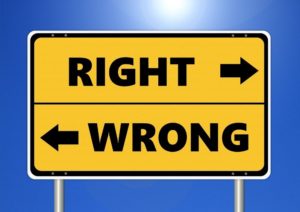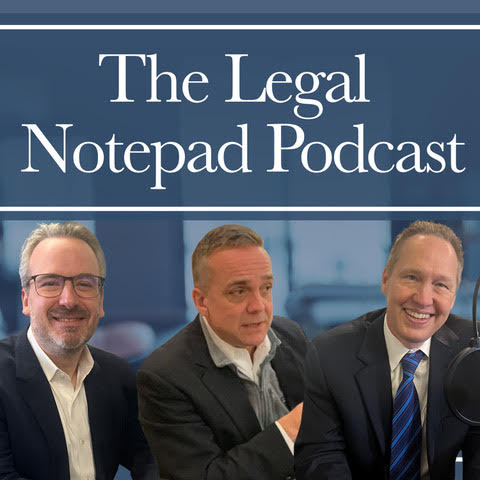Fake News and Fair Trials:

The Influence of Fake News on Normative Juror Beliefs
What does “Fake News” have to do with wrongful death, personal injury, and fair trials? Potentially way too much.
The use of re-marketing, re-targeting, cookies and IP-address matching, to target internet users with messaging based on their browsing experience, is not new. Marketers and web masters have been doing it for years. By now, almost everyone knows that if you click an article on your social or news feed, taking a certain position, your feed may flood with other articles taking the same position … or possibly another position to influence your beliefs. Or simply by clicking an outrageous headline, like millions of others, the popularity of that headline pushes it to the top of the news feed, and it looks like legitimate, top headline “news.” In this manner, the internet can be used to alter and reinforce normative beliefs. The “fake news” market took these targeting and popularity tools to a new level. So . . .
What is “fake news”; can it change our beliefs, and is it a threat to fair trials? It’s a frustrating, elusive topic. And, perhaps most disturbingly, “fake news” is already a household term. The phrase was coined less than two years ago, but in that short period of time, we became all too familiar with “fake news.” Though the phrase is now well known, many people don’t know how to recognize fake news – much less understand its impact on our judgment of people, situations, and events.
In recent judicial and ethical thought and literature, the topic has developed into the formal study of this question: What is the influence of fake news on normative (collective, random) juror beliefs? Obviously, jurors possessed normative beliefs long before the advent of “fake news” (or the internet for that matter). The formulation of normative beliefs is far beyond the scope of this blog. For now, it suffices to say that a “norm” in this sense is a standard for evaluating or making judgments about behavior or outcomes or a fact or observation about behavior or outcomes (without judgment). With fake news, the question becomes:
Given that most adults are regularly online and using social media, and are therefore exposed to unknown amounts of content designed to distort views and behavior through purposefully false information … how pervasive will the distortion become? Though our knee-jerk reaction is “fake news won’t change my views,” consider some of the troublesome thought and analysis raised by recent studies.

JURY PERSUASION IN AN ‘ALT-FACT’ WORLD
This article by Ken Broda-Bahm, Shelley Spiecker, and Kevin Boully, published in November of 2017, frames the potential risks of distorted normative beliefs and values. The authors explain:
“According to a 2016 Pew Research Center poll, only 39 percent of American adults are very confident they can differentiate between fake news and real news, leaving 61 percent who do not feel very confident in making the distinction. In the same study, 64 percent of American adults said they think fabricated news causes significant confusion about political and social issues today.”
As to the fundamental fairness of jury trials, the authors note that whereas more exposure to more information should lead to greater general knowledge of facts (which should be a good thing), increased uncertainty of fact can lead to a greater degree of general skepticism. You may think greater skepticism is good for juries and the fairness of trials, but the authors point to several potential risks, such as:
- “In cases with scientific experts, do juries bring a default support for science when it’s justified and explained, or do they have a cynical approach – i.e. anyone can gin up studies and support what they’re trying to prove?
- In the criminal or civil rights litigation context, do jurors have a habit of trusting and supporting the police, or are they trying to look for abuses of power and abuses of discretion?
- In toxic tort energy litigation, is there a default belief that these industries are causing irreparable and lasting environmental damage, or are jurors primed to think that this has all been exaggerated and overblown in order to channel public panic with junk science?
- When ascertaining the believability of witnesses, parties, experts, and lawyers, is education a credential, or does too much education mean someone has lost touch with reality?”
So, how much control do we have when forming and maintaining our own beliefs – despite constant exposure to false information through social media and paid content all over the internet? Of course, all content isn’t fake news, but how much of it is? Further, even if we recognize fake news, can we consciously decide not to let it influence us?
The Bad News About Fake News
 The above question is addressed by an article by Neil Levy, Senior Research Fellow, Oxford Uehiro Centre for Practical Ethics, published in July of 2017.
The above question is addressed by an article by Neil Levy, Senior Research Fellow, Oxford Uehiro Centre for Practical Ethics, published in July of 2017.
Therein, Levy examines the question of our ability to willingly control the influence of deceptive information, even if we discover it is deceptive. He opines:
“Worries about fake news may indeed be more serious when it is consumed by those who mistake it for genuine, but more sophisticated consumers are also at risk. Moreover, fake news corrected by fact checking [is not] disarmed; it continues to have pernicious effects, I will suggest.”
Levy describes what he calls the “naïve view” – where people are capable of re-classifying information – such that if we discover a fact not to be a fact, we naturally or easily re-classify the fact and maintain control over our beliefs. He argues that this naïve view has been proven false, citing several supporting studies showing that behavior is purposefully shaped by explicit “cues” of persuasion. He summarizes, “[t]he available evidence suggests that mental representations are not reliably and enduringly stored into exclusive categories.” Further:
“When we consume information, we represent the events described to ourselves. These representations might be usefully thought of as ways a possible world might be. Once these representations are formed, they may persist. In fact, though we may forget such information rapidly, some of these representations are very long-lasting and survive retraction: coming to accept inconsistent information does not lead to older representations being overwritten. These representations persist, continuing to shape the beliefs we ascribe to ourselves, the ways in which we process further information, and our behavior.”
This is a bold assertion- that we can’t re-categorize beliefs at will, and our behavior can be influenced or even controlled to unknown degrees by persuasion (with either false or true information). So, is Levy right or wrong? When trying a wrongful death claim, we have to err on the side of caution and assume Levy is right. If we dismiss the possibility that even one juror’s normative beliefs are based upon false information – normative beliefs that he or she isn’t even aware of – our clients could suffer devastating consequences. That’s an unacceptable risk.
At bottom, Levy’s argument makes sense. In simple terms, we are all products of everything we have ever encountered. As Alfred Lord Tennyson wrote in his epic poem “Ulysses”, “I am a part of all that I have met.” Everything we meet impacts us – fake or real, good or bad.
As attorneys handling cases which involve life-changing verdicts decided by a jury, we have to be even more diligent about discerning facts and persuasively presenting facts to juries. If the “normative beliefs” of the general population are increasingly influenced by fake news to unknown degrees, we must clarify and substantiate the truth of evidence – its source and the credibility of that source – so all jurors have the same understanding of the facts and our arguments.
As attorneys who are also members of the community that we are committed to protecting, we urge and encourage responsibility. Levy provides well-stated words of caution …
“I will argue that fake news is more pernicious than most of us realize, leaving long-lasting traces on our beliefs and our behavior even when we consume it [and] know it is fake, or when the [fake] information it contains is corrected. These effects are difficult to correct. We therefore ought to avoid fake or dubious news and work to eliminate it.”
Scary Thoughts. So, What Do We Do About it?
Avoid and eliminate fake news? We are all for that. But, is it possible? If not and if we are to live with fake news, can you help control the negative effects on yourself and others? Yes.
- Don’t click news or offers that you weren’t searching for – even if they appeal to you or seem interesting. Remember, false content is increasingly targeted to you based on your interests (determined by the content you click and your search history).Fake news exists because it’s funded by clicks. For example, the depressed, failing city of Veles, Macedonia essentially re-developed itself as an industry of “fake news” production, simply because their outrageous headlines and fake social accounts are clicked and followed by the millions. Without clicks, there is no market for fake news. We now know that social media was broadly used to spread false information about both candidates in the 2016 election. But, that was then, and this is now. If we remove the financial incentive, we go a long way toward eliminating the problem.
- If you’re searching for content and/or products, and content is served to you through social channels or paid content (ads) on websites you browse, ignore it. Only click content you, yourself initiated by searching for it.
- Look for the “https” in the address of websites you visit (e.g., https://www.decamillismattingly.com), which indicates that SSL security has been installed to encrypt and protect data coming and going through the website. If you’re looking for products, services, and/or information, and you arrive at an unknown site with a landing page with only “http” in the address, back out or close the window. Remember, the “s” in https means security. Opt for sites you know and trust and/or new sites which are SSL protected.
- Don’t accept connections from new “friends” you don’t know. Be sure that any new connections are with people who have friends in common with someone else you know.
- Use social media less … i.e. perhaps check twice a day, and only for the intended, healthy purposes of responding to friends, wishing people happy birthday, sending supporting messages to loved ones, etc. Less exposure is less risk and less of a “market” for fake news.
The internet is now virtually indispensable in most aspects of our lives – from social interaction to business, but always remember, it is also used extensively for harm. As in life before the internet, we simply have to learn the red flags so we can go on enjoying the healthy benefits of expanding friendships and maintaining connections with loved ones – while avoiding offers, requests, and/or information that are either too good to be true or so obviously just trying to catch our attention.
As stated at the outset of this blog … it’s a frustrating topic. While always wanting to avoid creating a scare, but always wanting to provide caution when it is needed, we find the correlation between “fake news” and altered beliefs potentially poses a serious threat to fair trials. And, at least the topic provides us an opportunity to say … surf the internet safely and learn what safe surfing means.
At DeCamillis & Mattingly, we are always happy to hear from you. Please let us know how we can assist with additional research, blogs, and/or commentary on this topic.
Further Reading:
https://columbiacollege-ca.libguides.com/fake_news/avoiding
http://www.plymouthlawreview.org/vol10/Jessica%20Clarke%20final.pdf
http://money.cnn.com/interactive/media/the-macedonia-story/
http://www.bbc.com/news/blogs-trending-42724320
http://www.bbc.com/news/magazine-38168281


